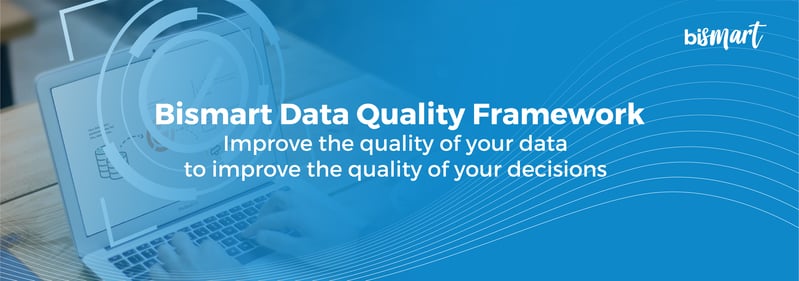What exactly is data quality? We explore 3 myths and one certainty about data quality in the enterprise environment and its use cases.
More and more business leaders understand the importance of data. However, data quality remains an unexploited and unfairly underappreciated area. We explore what data quality really is through 3 myths and a truth about data quality in the business environment.
-Sep-26-2023-08-58-10-9598-AM.png?width=799&height=533&name=MicrosoftTeams-image%20(7)-Sep-26-2023-08-58-10-9598-AM.png)
Today, virtually every company works with data on a daily basis. Data analysis has become a business process of vital importance for the smooth running of business operations.
More and more companies are realizing the importance of leveraging corporate and external data to make data-driven decisions, as well as to understand their own business.
The truth is that the vast majority of business data is not of sufficient quality to be transformed into value.
- According to a Harvard Business Review report, only 3% of a company's data meets the quality standards that, according to data quality experts, data must have to be usable.
- On the other hand, joint research by IBM and Carnegie Mellon University revealed that 90% of an organization's data is never successfully used for any strategic purpose.
Whatever the level of quality of an organization's data, chances are that senior managers are already making decisions based on it. If companies are making decisions based on poor quality data, how can they make good decisions?
Companies need to start validating the quality of their data immediately and address their data quality limitations as soon as possible.
- Discover Bismart Data Quality Framework, the solution that centralizes all data quality processes in a single environment and allows business users to validate the quality of their data by creating their own validation rules:
Corporations are striving to digitize and develop a data-driven culture, yet they are doing so with poor quality data.
This contradiction puts companies at a dangerous crossroads, to say the least, that can compromise their business.
At Bismart, we often say that the quality of your decisions depends on the quality of your data.
- According to Forrester, companies that use data for decision making are nearly three times more likely to achieve double-digit growth. As value-add increases, so does the likelihood that data will generate a sustainable competitive advantage.
But what exactly is data quality?
What is data quality and what is it for?
Data quality is a term used to define the quality standards that data must meet in order to be transformed into value, as well as the processes involved in ensuring data quality.
Data is considered to be of quality if it can be use to improve operations, in the decision-making process and if it complies with current data protection standards. In this sense, data quality is linked to data governance and data compliance.
The assessment of data quality is based on various aspects, such as data accuracy, completeness, consistency and reliability, among others. Data quality analysis processes are used to determine whether data is fit for its original purpose. Such measurement is of great use to organizations, as it enables them to detect errors and take action to address them.
In practice, ensuring data quality improves business performance. According to one study, digitally mature companies are 26% more profitable than their peers. Mckinsey found that data-driven companies record above-market growth and EBITDA increases of up to 25%.
However, there are many myths associated with data quality that are creating misconceptions about data quality.
The big myths about data quality
-
Myth 1: Data is a business asset
When we talk about data, we usually define it as a business asset. However, data by itself has no value and only becomes a business asset if it is processed, managed well and its quality is assured. Otherwise, it is a business passive. In other words, data must be refined or processed, just as crude oil is refined to produce gasoline.
Data is a business asset when its exploitation has the potential to improve any area of a company: whether increasing revenue, cost reduction, risk mitigation....
On the contrary, data often becomes a liability for the company when its volume is excessive, when it does not comply with privacy standards, when it does not have adequate data security measures and when its use is not useful to improve any aspect of the business.
In short, data is only a business asset when it is properly managed and its quality is validated.
-
Mito 2: Investing in data quality is not profitable
One of the main reasons why most companies are not sufficiently advanced in terms of data quality is that it is considered an unprofitable investment. Although virtually all companies have invested in data-related solutions in recent years, few have invested in data quality tools, software or processes.
It is not that data quality is unprofitable. However, its profitability is more difficult to visualize, since having optimal data quality does not usually generate immediate business value.
However, in the long term, data quality offers numerous benefits, such as early detection of potential data-related problems before they are discovered and reported by users, thus avoiding late consequences that could affect ongoing business or decisions.
Another indisputable benefit of having a data quality system is the generation of trust, both in the data itself and in the team in charge of its preparation.
Last but not least, the inclusion of data quality processes in a project can speed up and reduce development costs. The implementation of a system that guarantees data quality automatically avoids the team having to invest time in performing these tasks manually, which, in practice, translates into a large number of hours.
-
Myth 3: Ensuring data quality is an easy task
Another reason for the low business investment in data quality is that many corporate profiles mistakenly believe that their data is already of high quality or that ensuring the quality of their data is an easy task and that, therefore, they do not need a data quality solution or system. However, neither statement is true.
As mentioned above, only 3% of enterprise data meets the recommended quality expectations. On the other hand, ensuring the quality of corporate data involves multiple processes that result in a much more complex project than business users might imagine.
-
Truth: Automating data quality is extremely complex
In addition to the number of processes involved in ensuring data quality, these processes in turn require an expert data quality team that companies often do not have on staff. This, again, is another impediment that holds companies back when it comes to working on data quality.
The truth is that, until a few years ago, there were no systems to automate data quality verification processes and, therefore, the process was too large and complex to be tackled at the enterprise level.
Data quality experts have been anticipating the need for a solution to automate data quality for many years. However, until recently, solutions have always consisted of custom-built code snippets that only ensured minimal quality levels.
This all changed in 2019 with the emergence of Great_Expectations, an open source solution that allowed developers to automate their data quality processes. This solution solves the major handicap of data quality, but still puts the quality of the data that is ultimately exploited by business users in the hands of a few expert data quality users.
How to automate data quality and make it accessible to business users?
Automating data quality processes without the need for an entire team of data quality experts is now possible. Putting it in the hands of business users is also possible.
At Bismart we have been working for years on integrated processes that allow other organizations to take advantage of the potential of their data and transform it into better business decisions. Because we are aware that without quality data it is impossible to make quality decisions, we have created the Bismart Data Quality Framework solution.

Bismart Data Quality Framework, based on Great_Expectations, is a technology designed for corporate environments that want to work on the quality of their data. The solution centralizes data quality processes in a user-friendly and easily accessible environment that allows business users to validate the quality of their data without having to resort to experts. After all, business users are the end users of the data and the main consumers. Providing them with a tool where they can validate that the data they work with is accurate, consistent, reliable, up-to-date and error-free is of paramount importance.
In addition, the solution allows users to define their own validation rules to adapt them to their business needs and internal policies.
-
All data quality processes in one place.
-
Customized quality standards and expectations.
-
Supports both technical and functional validation rules.
-
Automatic error detection.
-
Allows the execution of corrective actions.
-
Includes a system of alerts that can be integrated into monitoring tools —such as Power BI— and collaborative work tools such as Microsoft Teams, any type of email, etc.
-
Open system, easily extensible and customizable.
Conclusion
There is still a long way to go in ensuring that data quality is a general rule in the business environment.
However, the first step is for companies to give the quality of their data the importance it deserves. Understanding the relevance of data, i.e., realizing its ability to solve a particular business problem, is the basis for coming to understand the relevance of having confidence in data.

.png?width=352&name=MicrosoftTeams-image%20(7).png)

